Transforming Your Bathroom: A Guide to Building a DIY Vanity with Makeup Station
Related Articles: Transforming Your Bathroom: A Guide to Building a DIY Vanity with Makeup Station
Introduction
With great pleasure, we will explore the intriguing topic related to Transforming Your Bathroom: A Guide to Building a DIY Vanity with Makeup Station. Let’s weave interesting information and offer fresh perspectives to the readers.
Table of Content
Transforming Your Bathroom: A Guide to Building a DIY Vanity with Makeup Station

The bathroom is often considered a sanctuary, a place to unwind and pamper oneself. Yet, limited space and a lack of dedicated areas can often hinder the creation of a truly functional and aesthetically pleasing environment. A DIY bathroom vanity with a built-in makeup station addresses this issue, offering a solution that is both practical and personalized. This guide will delve into the intricacies of constructing such a vanity, providing a step-by-step approach for those seeking to enhance their bathroom’s functionality and style.
The Allure of a DIY Bathroom Vanity with Makeup Station
Beyond the aesthetic appeal, a DIY bathroom vanity with a makeup station presents several compelling benefits:
- Enhanced Organization: The vanity provides dedicated storage for toiletries, makeup, and other bathroom essentials, eliminating clutter and promoting a sense of order.
- Improved Functionality: A dedicated makeup station within the vanity allows for a streamlined and efficient application process, making it easier to achieve a flawless look.
- Personalized Design: The DIY approach grants complete control over the design, enabling the creation of a vanity that perfectly complements the bathroom’s existing decor and personal preferences.
- Cost-Effectiveness: Building a vanity from scratch can significantly reduce expenses compared to purchasing a pre-made unit, especially when factoring in customization options.
- Sense of Achievement: Completing a DIY project instills a sense of accomplishment and pride in creating a functional and beautiful space.
Planning the Perfect Vanity
Before embarking on the construction process, meticulous planning is essential. This involves:
- Defining Space and Functionality: Assess the available space in the bathroom and determine the desired dimensions of the vanity. Consider the number of drawers, shelves, and compartments needed for optimal storage.
- Choosing Materials: Select materials that align with the bathroom’s aesthetic and budget. Common options include wood, plywood, MDF, and laminate. Factors like moisture resistance, durability, and ease of workability should be considered.
- Determining the Makeup Station Configuration: Decide on the layout of the makeup station. This could include a pull-out tray, a dedicated drawer, or a mirrored surface with built-in lighting.
- Selecting Hardware: Choose knobs, pulls, hinges, and other hardware that complement the vanity’s style and functionality.
- Considering Lighting: Adequate lighting is crucial for applying makeup. Explore options such as under-cabinet lighting, vanity lights, or a combination of both.
- Drafting a Blueprint: Creating a detailed blueprint or sketch helps visualize the final product and ensures accurate measurements for cutting and assembling the vanity.
Step-by-Step Construction Guide
Once the planning phase is complete, the construction process can begin. Here’s a detailed breakdown:
1. Building the Vanity Base:
- Cut the Base: Using a circular saw or table saw, cut the base panels according to the blueprint. Ensure precise measurements and clean cuts for a seamless finish.
- Assemble the Base: Join the base panels using wood glue and screws. Use clamps to secure the pieces while the glue dries.
- Add Reinforcements: For added stability, install a piece of plywood or MDF as a support beam across the base.
- Attach Legs or Casters: Select the preferred base support method. Legs provide a traditional look, while casters offer mobility. Attach them securely to the base.
2. Constructing the Cabinet:
- Cut Cabinet Panels: Cut the cabinet sides, back, and shelves according to the blueprint.
- Assemble the Cabinet: Join the cabinet panels using wood glue and screws.
- Install Shelves: Attach shelves to the cabinet sides, ensuring they are level and properly supported.
- Add Drawer Slides: If incorporating drawers, install drawer slides to the cabinet sides, following the manufacturer’s instructions.
3. Building the Makeup Station:
- Design the Makeup Station: Determine the type of makeup station to be incorporated. This could be a pull-out tray, a dedicated drawer, or a mirrored surface with built-in lighting.
- Construct the Makeup Station Components: Cut and assemble the necessary components for the chosen makeup station design.
- Install the Makeup Station: Securely attach the makeup station components to the cabinet or vanity base.
4. Finishing Touches:
- Sanding and Finishing: Sand the entire vanity to achieve a smooth surface. Apply a stain or paint to achieve the desired color and finish.
- Installing Hardware: Attach knobs, pulls, hinges, and other hardware to the vanity and makeup station.
- Installing Lighting: Install the chosen lighting fixtures, ensuring they are wired correctly and provide adequate illumination.
- Adding a Countertop: Select a suitable countertop material such as granite, marble, or laminate. Securely attach the countertop to the vanity base.
5. Final Assembly and Installation:
- Attaching the Cabinet to the Base: Securely attach the cabinet to the base using screws or other fastening methods.
- Installation: Position the vanity in its desired location in the bathroom. Level it and secure it to the wall if necessary.
- Adding Accessories: Add any additional accessories such as a mirror, towel rack, or storage baskets to complete the vanity setup.
FAQs about DIY Bathroom Vanity with Makeup Station
Q: What tools are required for building a DIY bathroom vanity with a makeup station?
A: Essential tools include a circular saw, table saw, drill, screwdriver, measuring tape, level, clamps, sandpaper, wood glue, and screws. Additional tools may be required depending on the chosen materials and design.
Q: What are the best materials for a DIY bathroom vanity with a makeup station?
A: Moisture-resistant materials like plywood, MDF, and laminate are suitable for bathroom vanities. Wood can also be used, but it requires proper sealing and finishing to prevent water damage.
Q: How can I ensure the vanity is durable and stable?
A: Use sturdy materials, reinforce corners and joints, and install supports where needed. Proper construction techniques and quality hardware are crucial for longevity.
Q: What are some ideas for incorporating a makeup station into the vanity?
A: Consider a pull-out tray for easy access to makeup items, a dedicated drawer with dividers for organization, or a mirrored surface with built-in lighting for a dedicated makeup area.
Q: How can I make the vanity aesthetically pleasing?
A: Choose materials and hardware that complement the bathroom’s existing decor. Consider incorporating decorative elements such as moldings, trim, or a unique countertop.
Q: What are some tips for creating a functional makeup station within the vanity?
A: Include adequate lighting, consider a built-in mirror with magnification, and prioritize organization with drawers, trays, and compartments.
Conclusion
Creating a DIY bathroom vanity with a makeup station offers a rewarding and transformative experience. By meticulously planning, selecting quality materials, and following the construction guide, individuals can achieve a personalized vanity that enhances both the functionality and aesthetics of their bathroom. The result is a sanctuary that caters to their needs and reflects their unique style.
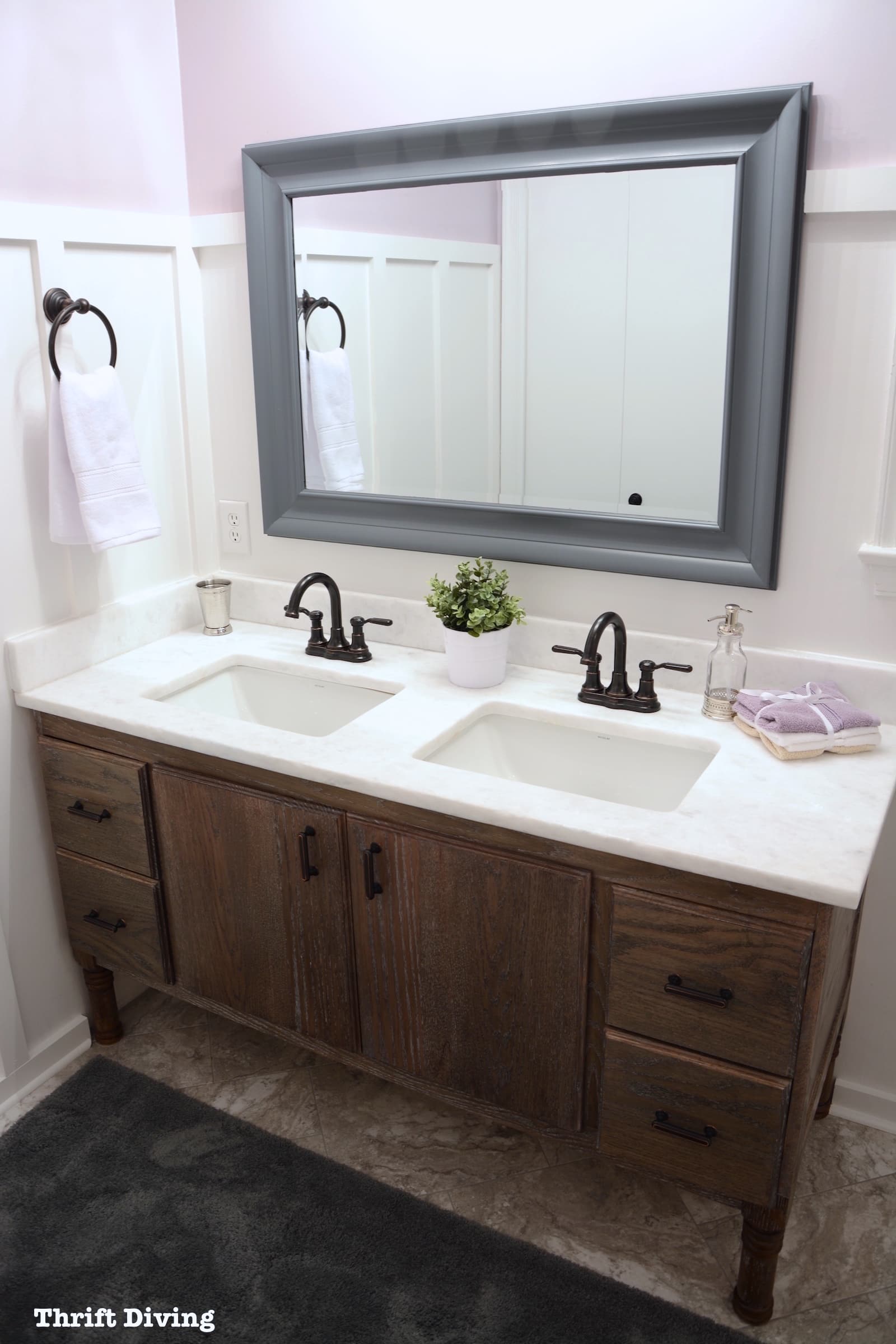
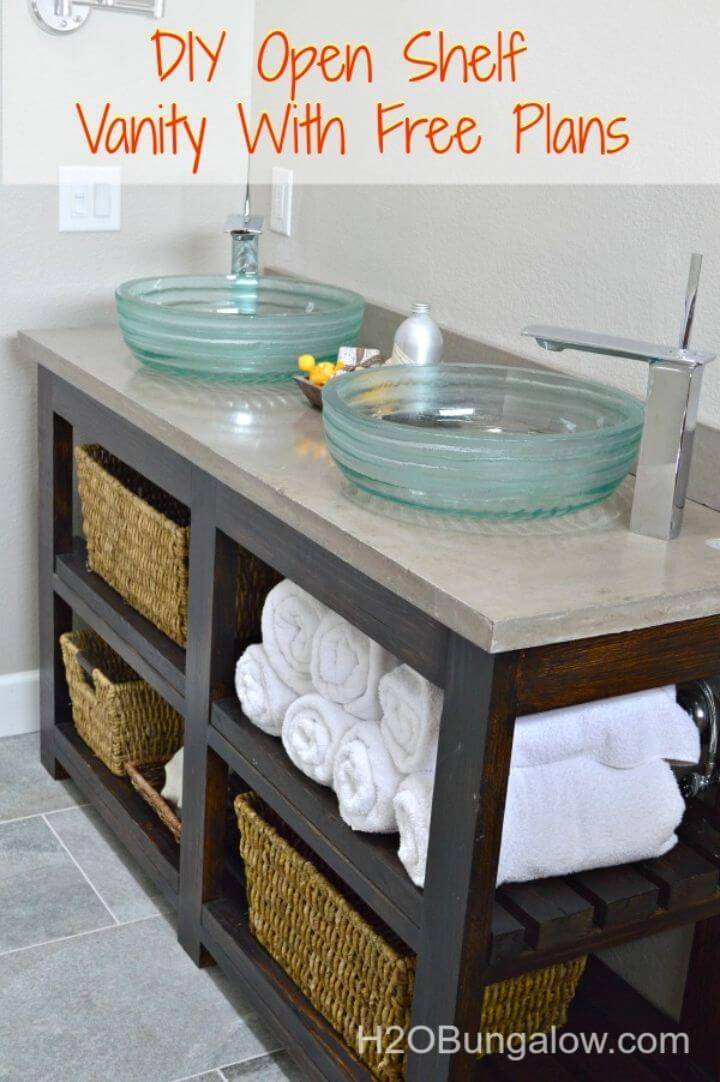
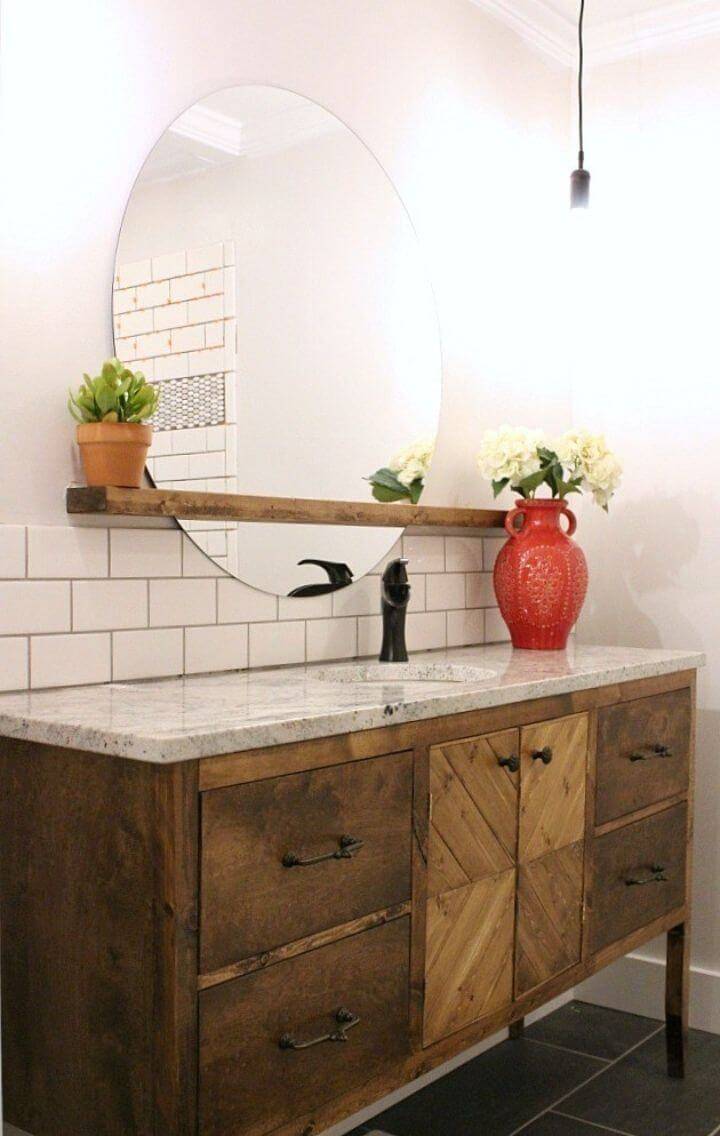
/vanity-white-cabinets-b1000fc17159498d94a208c89614128b.jpg)

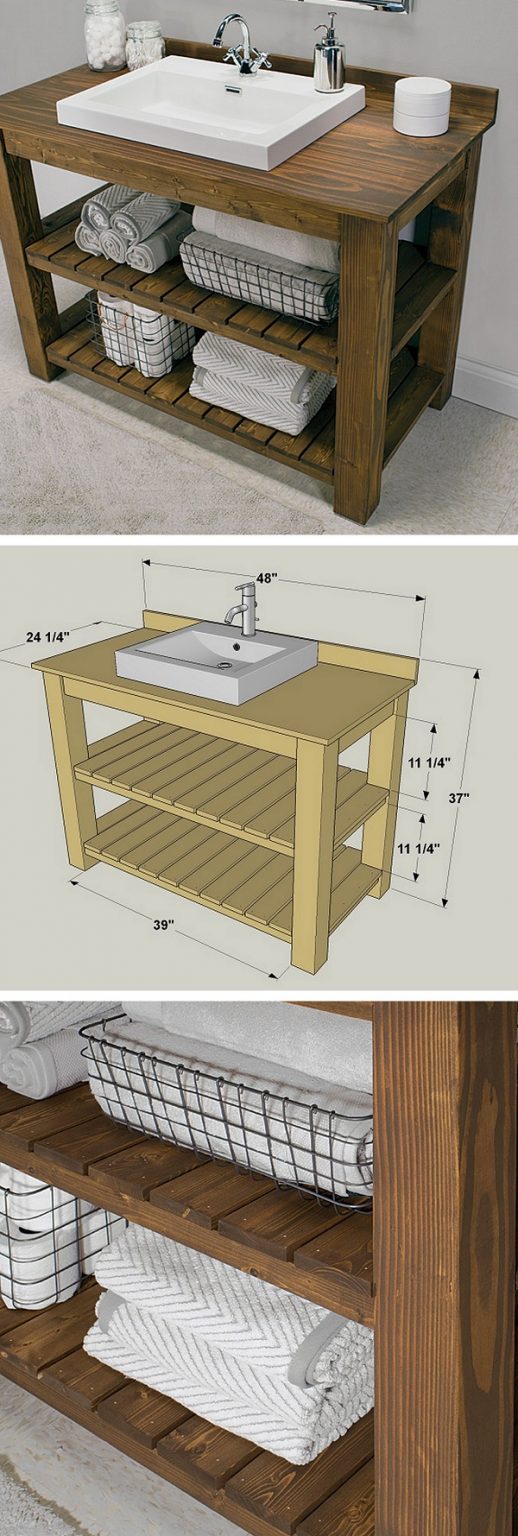
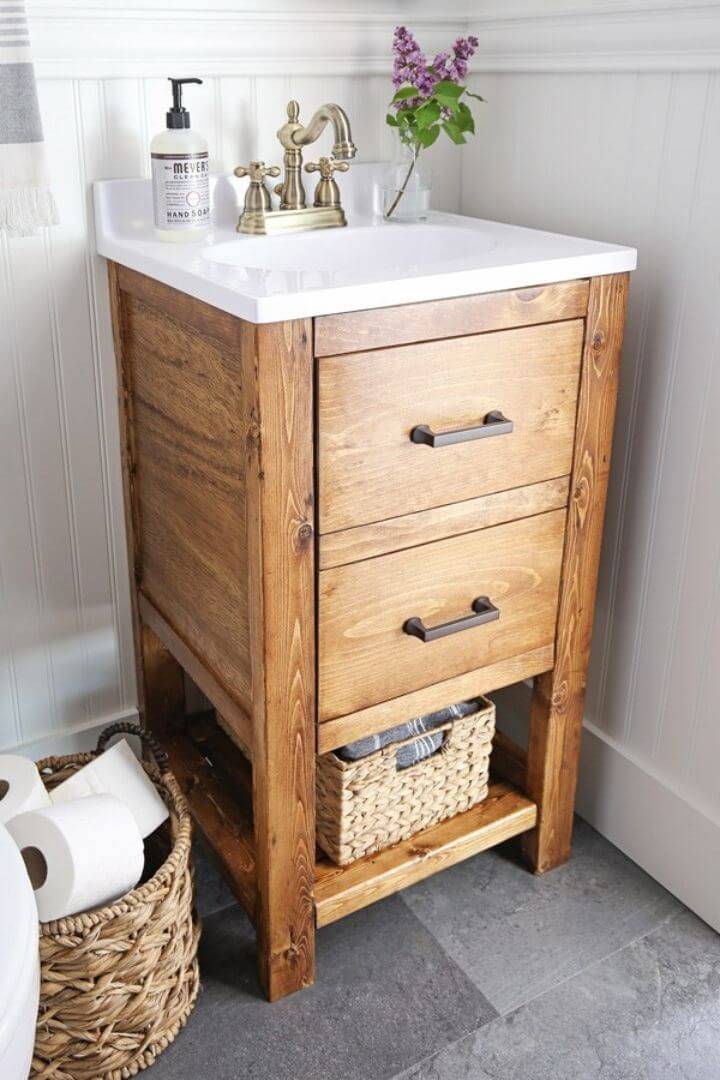

Closure
Thus, we hope this article has provided valuable insights into Transforming Your Bathroom: A Guide to Building a DIY Vanity with Makeup Station. We appreciate your attention to our article. See you in our next article!